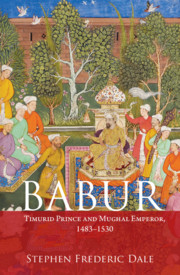Book contents
- Frontmatter
- Dedication
- Contents
- List of Illustrations and Maps
- Preface
- Abbreviations
- Introduction
- 1 Qazaq: A Timurid Vagabond
- 2 Padshahliq, Governance, in Kabul
- 3 Mulkgirliq: The Act of Kingdom-Seizing
- 4 Padshahliq, Governance, in Hindustan
- 5 Gurbatliq: An Indian Exile
- Conclusion
- Glossary
- Bibliography
- Index
- Plate section
Introduction
Published online by Cambridge University Press: 13 September 2018
- Frontmatter
- Dedication
- Contents
- List of Illustrations and Maps
- Preface
- Abbreviations
- Introduction
- 1 Qazaq: A Timurid Vagabond
- 2 Padshahliq, Governance, in Kabul
- 3 Mulkgirliq: The Act of Kingdom-Seizing
- 4 Padshahliq, Governance, in Hindustan
- 5 Gurbatliq: An Indian Exile
- Conclusion
- Glossary
- Bibliography
- Index
- Plate section
Summary
Zahir al-Din Muhammad Babur (1483–1530) was an individual of major political and literary importance in the early modern era and beyond. Politically, he was a pivotal figure in the history of both Central Asia and India. Thus, by successfully conquering the north Indian heartland between 1526 and 1530, he initiated a Timurid Renaissance, revitalising the dynastic history of Temür's descendants by founding what has come to be known erroneously as the Mughal or Mongol Empire. In literature, he wrote the world's single most vital, revealing and engaging dynastic autobiography, an incomparable work of humanistic interest that also contains unique information about Central Asian life and politics and Indian society in the late fifteenth and early sixteenth centuries. Babur once wrote to a kinsman, upbraiding him for failing to join the coalition fighting the Uzbeks – the Timurids’ implacable enemies, by reminding him: ‘a person's acts outlive him… Wise men have called an illustrious name a second life’. Doubly illustrious as a conqueror and writer, he has enjoyed a considerable second life, although not as fully or meaningfully as he deserves considering his achievements. This biography represents an effort to ensure that his first life is better understood in order that his second might be more widely and sympathetically acknowledged.
Babur, as he is simply and usually known, was a fifth-generation patrilineal descendant of the Central Asian conqueror Temür, also known as Tîmur-i lang, ‘Timur the Lame’ or Tamerlane (1336–1405). He traced his descent through Temür's son Miran Shah (1366–1408), once a governor of parts of Afghanistan and Iran. On his mother's side, he was a fifteenth-generation matrilineal descendant of Chinggis Khan (1162–1227) through Chinggis Khan's son Chaghatai Khan (1226–42), who had ruled Mongol territories in Central Asia. In dynastic terms, Babur referred to himself either as a Turk, or a Timurid, and like other patrilineal descendants of Temür, he inherited the title mirza – an Arabic-Persian contraction of the phrase amir zadeh, son of an amir, a prince or noble. His Chaghatai Mongol male kins were known as khans, after their patrilineal descent from Chinggis Khan. Babur never thought of himself as a Mongol, but his dual descent justifies calling his Indian conquests the Timurid-Mughal Empire.
- Type
- Chapter
- Information
- BaburTimurid Prince and Mughal Emperor, 1483-1530, pp. 1 - 22Publisher: Cambridge University PressPrint publication year: 2018



